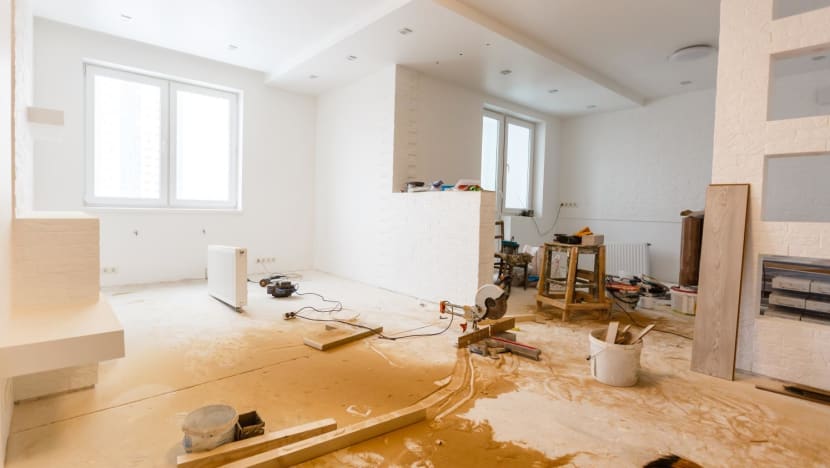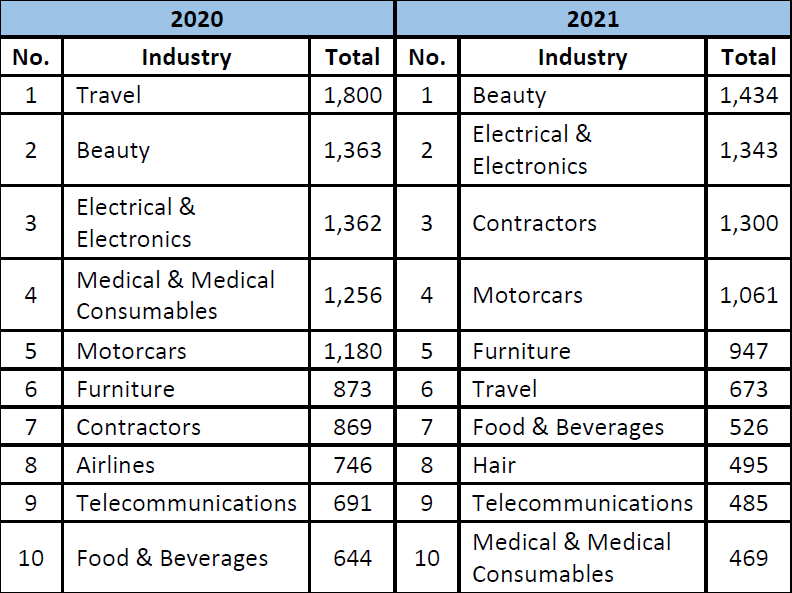Complaints against renovation contractors jump almost 50% in 2021: CASE

File photo of a house undergoing renovation. (Photo: iStock)
SINGAPORE: The number of consumer complaints against renovation contractors jumped by almost 50 per cent in 2021, with nearly half of them about unsatisfactory workmanship or contractors failing to complete projects on schedule.
This comes as the Consumers Association of Singapore (CASE) released consumer complaints data for 2021 on Monday (Jan 31). A total of 15,515 complaints were logged last year, down 15.3 per cent from the 18,335 complaints in 2020, said CASE.
"The decrease is largely attributed to a significant drop in the number of complaints against the travel and medical and medical consumables industries," said CASE.
Of the 15,515 complaints, CASE advised 86.7 per cent of the consumers how to resolve their disputes with the businesses. It also helped 13.3 per cent of the consumers negotiate and mediate their disputes with businesses.
In all, CASE said that 64.7 per cent of those cases were resolved, with S$2 million - in-cash and in-kind - recovered for consumers.
The association said the composition of consumer complaints it received in 2021 has returned to pre-2020 levels, an "early sign" that consumer purchasing behaviour and habits in Singapore have stabilised to pre-pandemic levels.
INCREASE IN RENOVATION CONTRACTOR COMPLAINTS
CASE received 1,300 complaints against home renovation contractors in 2021, up almost 50 per cent from the 869 complaints in 2020.
"Close to half of the complaints against the industry were about renovation contractors failing to complete projects on schedule and unsatisfactory workmanship," said the association.
The increase in complaints was attributed to the prolonged shortage in manpower and raw materials arising from continued border restrictions due to COVID-19, pent-up demand in the residential property market, as well as a corresponding demand for home renovation last year.
“To protect their interests, consumers are advised to avoid making large sums of prepayment upfront, and to negotiate for progressive payments to be made as each stage of the renovation work is completed,” said CASE president Melvin Yong.
SHARP INCREASE IN PREPAYMENT LOSSES
CASE also said that consumers who prepaid for items or services such as beauty and bridal packages took a greater hit last year.
Consumers suffered more than S$520,000 in prepayment losses last year, a sharp increase from the S$190,000 reported in the previous year.
The beauty and bridal industries saw the greatest amount of prepayment losses in 2021. Consumers who made prepayments for beauty and bridal packages were unable to get a refund of their money due to business insolvency.
“Prepayment protection is an area of deep concern for CASE," said Mr Yong.
To better protect consumers against "hefty financial losses" due to company closures, Mr Yong said CASE has called on the Government to consider mandating prepayment protection in industries that collect large sums of prepayment.
"And as part of licensing conditions, require the industry to better inform consumers of the steps they can take to protect themselves against business closure," said Mr Yong.

BEAUTY INDUSTRY TOPS CONSUMER COMPLAINTS
Complaints against the beauty industry took the top spot, accounting for almost one in 10 complaints received in 2021, said CASE.
The association received 1,434 complaints against the industry last year, a 5 per cent increase over 2020.
About one quarter of complaints against spas and beauty salons were related to pressure sales tactics and misleading claims.
Some consumers complained they were not allowed to leave the beauty salons unless they bought higher price packages, others said expensive treatments were performed on them without their consent and that they were then charged for those treatments.
There were also complaints about beauty salons misleading consumers on the number of sessions in the packages and how certain treatments could cure or alleviate pre-existing health ailments.
To safeguard consumers against such unfair practices in the industry, CASE signed a Voluntary Compliance Agreement with one beauty salon and referred three others to the Competition and Consumer Commission of Singapore for investigation in 2021.
To address "perennial complaints" from consumers that they were pressured to buy a package deal, Mr Yong said CASE has called on the Government to extend the coverage of the mandatory cooling-off period under the Consumer Protection (Fair Trading) (Cancellation of Contracts) Regulations to spa and beauty purchases.
This will allow time for consumers to consider their purchase and provide them an avenue to cancel their purchases, said Mr Yong.
TRAVEL INDUSTRY SEES DROP IN COMPLAINTS
In contrast, the travel industry saw a 62.6 per cent drop in the number of complaints last year.
The industry had previously topped the list of consumer complaints in 2020, according to CASE data released last year.
A "substantial" proportion of the complaints were related to travel bookings made before the onset of COVID-19, said CASE.
"Some consumers complained that they were unable to get refunds for expired travel vouchers previously given for flights or tour packages which were postponed in 2020," it added.
Additionally, there were 18 complaints related to vaccinated travel lane flight bookings and bus tickets. Most of these were related to changes in flight bookings and quarantine issues.
"Given the evolving global travel restrictions, consumers are advised to purchase tickets from airlines which offer complimentary rebooking of flights," said Mr Yong.
Consumers were also advised to read through the terms and conditions of the flight booking or tour package, and to take note of written provisions for refunds and cancellations.
DROP IN E-COMMERCE COMPLAINTS
The association received 2,206 complaints related to online purchases in 2021, accounting for about 14 per cent of the total complaints received.
The number is a 49 per cent decline over the 4,366 complaints received in 2020, due to a sharp drop in complaints related to face masks, hand sanitisers, airline tickets and tour packages.
The two most common types of e-commerce complaints in 2021 were related to defected or "non-conforming goods", as well as delivery issues such as delayed deliveries, incomplete deliveries and wrong deliveries.
"As the digital economy evolves, new retail practices will emerge, and consumer shopping habits will change accordingly," said Mr Yong.
To help consumers resolve e-commerce complaints "quickly and efficiently", CASE launched a framework in 2021.
"(It) provides guidance to e-marketplaces to align dispute resolution processes and give consumers assurance when they shop," he said.
Lazada Singapore has signed a memorandum of understanding with CASE to adopt the framework.
"We hope that more e-marketplaces will come on board soon, so that their customers can have peace of mind shopping on their platforms,” said Mr Yong.
Consumers are encouraged to patronise CaseTrust-accredited businesses, which are committed to fair business practices and consumer-friendly policies, said CASE.
These businesses are also required to attend mediation with consumers should disputes reach a deadlock.
In 2021, the resolution rate of consumer disputes involving CaseTrust-accredited businesses was 73.6 per cent, higher than the 64.4 per cent resolution rate for non-accredited businesses.
Businesses accredited under the CaseTrust Renovation and Spa and Wellness scheme are required to protect consumers’ prepayments or deposits, said the association.
CaseTrust-accredited spas and wellness businesses offer a five-day cooling-off period for consumers, while CaseTrust-accredited renovation contractors are required to protect consumers' prepayments via the purchase of a deposit performance bond, said CASE.
Overall, complaints against the beauty and renovation contractor industries remain a concern, said Mr Yong.
"CASE will continue to engage the Government and industry stakeholders to strengthen consumer safeguards and stamp out unfair practices in a timely manner.
"We will also work with trade associations to increase the CaseTrust accreditation rates for industries with a high number of complaints, so as to reduce undesirable business practices and better protect consumers."

















